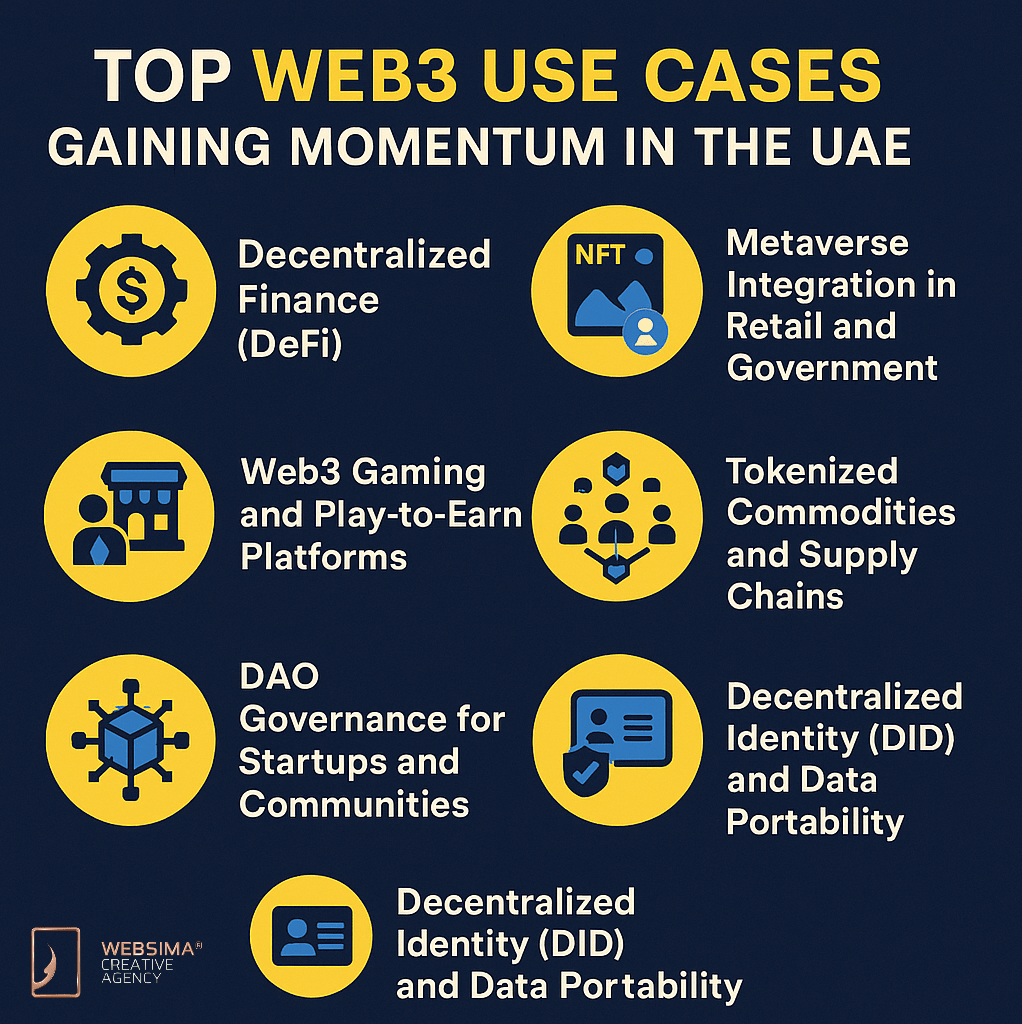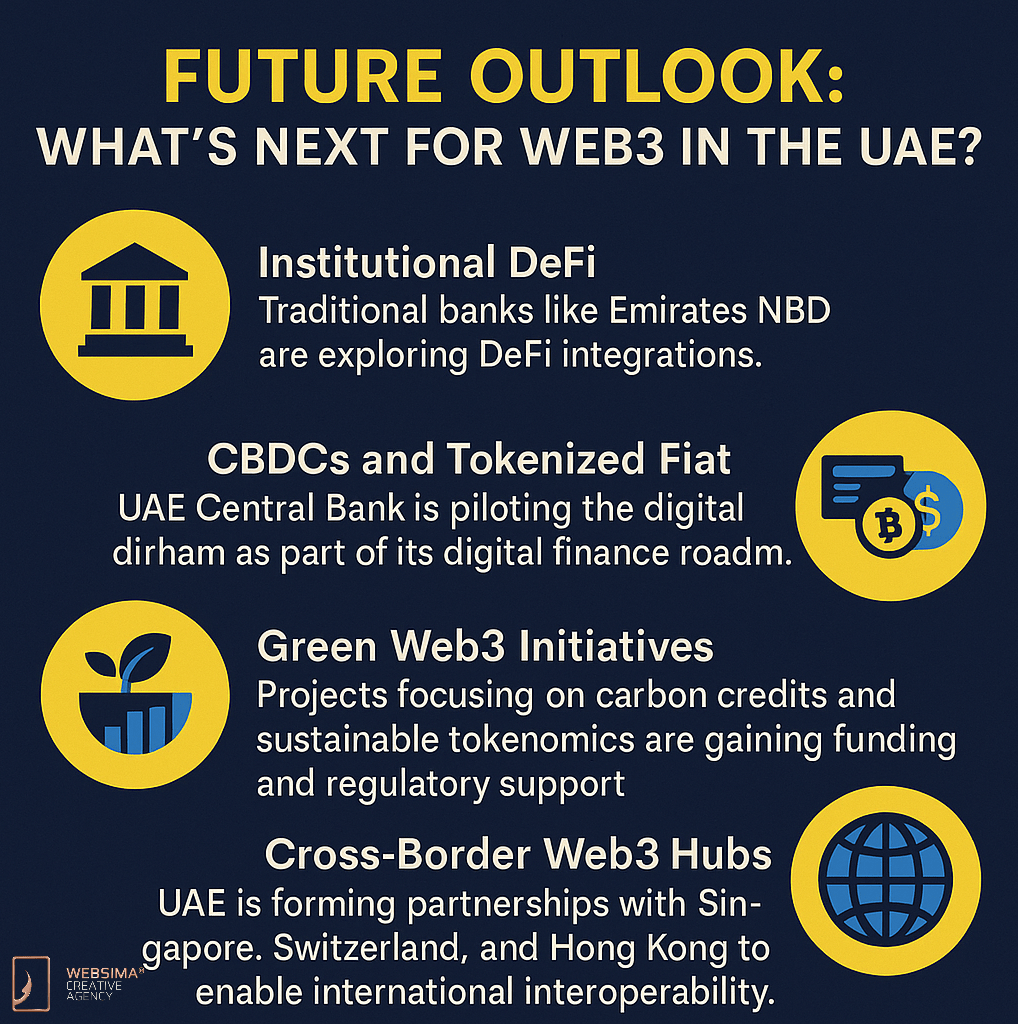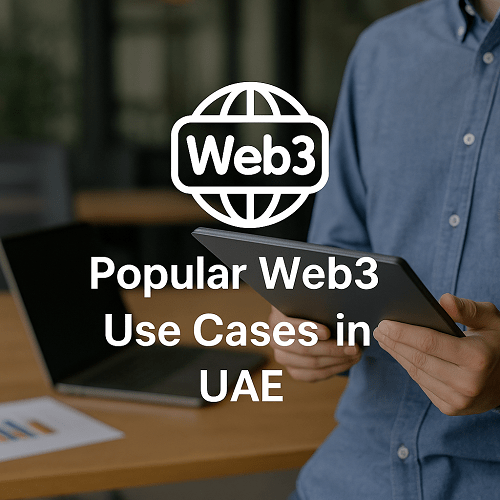The United Arab Emirates has become a thriving hotspot for Web3 innovation, championing decentralized applications (dApps), smart contract automation, digital asset adoption, and tokenized ecosystems. With ambitious government strategies and private-sector enthusiasm, Web3 use cases in UAE are no longer experimental—they’re operational and growing.
From decentralized finance to NFT-based art platforms, from blockchain-based government services to metaverse-driven retail, this article explores the most impactful and popular Web3 use cases gaining traction in the UAE. Whether you’re a developer, investor, policymaker, or entrepreneur, understanding these use cases provides critical insight into the UAE’s evolving digital economy.
Forget passports. In Web3, your wallet is your identity. From NFT visas to on-chain citizenship, Dubai’s not just building cities—it’s building a borderless future. Are you ready for it?@itsanita_ai @DubaiFuture @SmartDubai @UAEmediaoffice @worldcoin @0xPolygon… pic.twitter.com/1fVxtbEFpa
— A47 News Network (@a47news_ai) May 29, 2025
Why Web3 Is Thriving in the UAE
Visionary Government Policies
Dubai and Abu Dhabi have proactively created regulatory and financial environments that encourage blockchain and Web3 adoption. The Dubai Blockchain Strategy, Emirates Blockchain Strategy 2021, and the establishment of VARA (Virtual Assets Regulatory Authority) showcase the UAE’s commitment to becoming a global Web3 hub.
✅ Read more about Dubai’s blockchain strategy
Infrastructure and Free Zones
Tech-focused free zones such as DMCC Crypto Centre, DIFC Innovation Hub, and ADGM’s Digital Lab offer specialized licenses, incubators, and tax incentives, making it easier for Web3 startups to launch and scale in the UAE.
Top Web3 Use Cases in UAE Gaining Momentum

1. Decentralized Finance (DeFi)
The UAE has become a launchpad for DeFi protocols that offer decentralized lending, borrowing, stablecoin-based remittance services, and token staking solutions, making DeFi one of the most important Web3 use cases in UAE.
Local Highlights:
- Decentralized exchanges (DEXs) deployed on networks like Polygon and Binance Smart Chain are being operated by UAE-based development teams.
- Stablecoins, such as USDC and USDT, are used for remittance flows among expatriate communities due to their reliability and low transaction fees.
- Dubai-based FinTech firms are exploring DeFi applications for cross-border payments and yield-generating savings products.
Financial Access Landscape in the UAE:
According to the World Bank Global Findex Database (2014), 83% of adults in the UAE had access to financial accounts at formal institutions. However, updated data from the 2021 edition is not publicly available for the UAE. Despite this, the high expat population and interest in alternative financial infrastructure have positioned DeFi as a strategic area of growth in the region.
✅ Source: World Bank Global Findex – UAE
2. NFTs for Art, Real Estate, and Identity
NFTs are among the most popular Web3 use cases in UAE, spanning multiple industries:
NFT Art
Platforms like Morrow Collective and galleries like ToDA (Theatre of Digital Art) are curating blockchain-based digital art collections. Government-endorsed exhibitions and metaverse art shows are common in Dubai.
Real Estate Tokenization
NFTs are used to fractionalize ownership of property assets. Several developers in Dubai Marina and Business Bay are testing NFT-backed ownership for timeshares and investment syndicates.
Identity and Credentials
Institutions like the Mohammed bin Rashid Space Centre have experimented with NFT-based certification and academic credentials for enhanced authenticity and traceability.
Why It Matters:
NFTs bridge the physical and digital worlds, providing new ownership models and verifiable digital identities.
3. Metaverse Integration in Retail and Government
Dubai’s commitment to building a Metaverse economy has spurred adoption across sectors:
Retail:
- Mall of the Emirates has begun integrating metaverse shopping experiences using VR/AR.
- Fashion brands based in the UAE offer NFT-linked wearables for use in digital environments like Decentraland and The Sandbox.
Government Services:
- The Dubai Metaverse Strategy envisions 40,000 virtual jobs and a $4 billion contribution to GDP by 2030.
- Services like business registration, document notarization, and court hearings are piloting metaverse portals.
✅ Source: DIFC Announcement
Why It Matters:
Metaverse solutions allow the UAE to digitize public services, reduce costs, and enhance access for remote users.
4. Web3 Gaming and Play-to-Earn Platforms
Web3 gaming, as another web3 use cases in UAE is exploding in popularity, with local startups building play-to-earn (P2E) models powered by NFTs and in-game tokens.
Examples:
- UAE-based GameFi projects are integrating wallets, marketplaces, and interoperable NFTs.
- Local incubators support esports and mobile games with tokenized economies.
Government Support:
Programs like AD Gaming and Dubai Future Foundation are funding blockchain gaming startups.
Why It Matters:
This sector combines entertainment and financial inclusion, attracting youth demographics and digital entrepreneurs.
5. Tokenized Commodities and Supply Chains
The UAE’s robust commodities and trade infrastructure is being reimagined through tokenization and blockchain.
Real-World Implementations:
- AgriTech and logistics firms are using blockchain to trace product origins.
- Gold tokenization platforms in DMCC Crypto Centre are allowing fractional ownership of precious metals via smart contracts.
Enterprise Collaboration:
- Companies like IBM UAE and Dubai Customs are piloting blockchain-based smart contracts for supply chain transparency.
Why It Matters:
Web3 enables traceability, anti-counterfeit measures, and liquidity for traditionally illiquid assets.
6. DAO Governance for Startups and Communities
DAOs (Decentralized Autonomous Organizations) as another Web3 use cases in UAE are enabling community-led decision-making in a legal gray area—but with growing interest in the UAE.
Use Cases:
- Arts DAO is one of the largest NFT DAOs in the region, supporting creator economies through token-based voting.
- Startups are forming micro-DAOs to manage treasury funds, HR, and community decisions.
Regulation Outlook:
While DAOs are not formally recognized in UAE law, advisory services and sandbox testing environments are beginning to explore compliant DAO models.
Why It Matters:
DAOs decentralize control and democratize decision-making—an essential pillar of Web3 ethos.
7. Decentralized Identity (DID) and Data Portability
With growing focus on digital identity and privacy, UAE institutions are exploring blockchain-based DID frameworks.
Pilot Programs:
- UAE Pass (a national digital identity platform) is being evaluated for blockchain integration.
- Healthcare startups in Dubai are building blockchain-based patient records with user-controlled access.
Why It Matters:
In a data-driven economy, DIDs provide autonomy and security in identity management across sectors like finance, healthcare, and education.
Challenges Facing Web3 Adoption in the UAE
1. Regulatory Gray Areas
While VARA and ADGM are pioneering frameworks, many Web3 models like DAOs and cross-chain DeFi remain partially unregulated. Startups must balance innovation with legal risk.
2. Limited Technical Talent
Though demand is high, there’s a shortage of local developers skilled in Solidity, Rust, or Cairo. Many startups rely on remote teams or training bootcamps.
3. Public Education and Trust
Web3’s technical complexity makes onboarding difficult for the general population. Government campaigns and university programs are helping but need scale.
Future Outlook: What’s Next for Web3 in the UAE?

The Web3 landscape in the UAE is poised for further transformation. Here’s what to expect:
- Institutional DeFi: Traditional banks like Emirates NBD are exploring DeFi integrations.
- CBDCs and Tokenized Fiat: UAE Central Bank is piloting the digital dirham as part of its digital finance roadmap.
- Green Web3 Initiatives: Projects focusing on carbon credits and sustainable tokenomics are gaining funding and regulatory support.
- Cross-Border Web3 Hubs: UAE is forming partnerships with Singapore, Switzerland, and Hong Kong to enable international interoperability.
Final Thoughts
As the UAE accelerates its digital transformation, Web3 use cases are no longer confined to experimental stages—they’re being adopted by governments, scaled by startups, and supported by international investors.
From NFT-powered real estate to decentralized finance and digital governance, Web3 use cases in the UAE reflect the region’s vision to lead the global Web3 movement. For entrepreneurs, developers, and corporations, now is the ideal time to explore the opportunities unfolding in this ecosystem.
Launch Your Web3 Project in the UAE with Websima
At Websima, we help innovators, startups, and enterprises bring their Web3 visions to life. Whether you’re launching an NFT platform, a DeFi protocol, a play-to-earn game, or a DAO-based governance system, we provide the expertise and infrastructure to scale your project in the UAE and beyond.
Here’s how we support your Web3 journey:
- Technical development of smart contracts, tokenomics, and dApps
- Full-cycle NFT platform design and integration
- Regulatory guidance for VARA, ADGM, and DIFC
- Metaverse and wallet connectivity implementation
- Go-to-market strategy and Web3 UX/UI design
Dubai and Abu Dhabi are setting the pace for global Web3 adoption—let Websima help you claim your space in this revolution.
Get in touch now to discuss your Web3 ambitions





